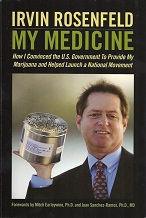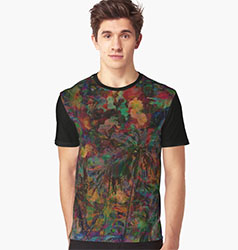Speaking via Skype, Branson, an unapologetic cannabis supporter, said he's spent the past five years serving on the Global Commission on Drug Policy along with former United Nations General Secretary Kofi Annan and 15 former world leaders calling not only for the controversial decriminalization of drugs, but also for its legalization worldwide.
"That's the only way of sorting out the problems that come with drugs by not regulating and leaving it up to the underworld to supply drugs," he said. "Our commission has worked really quite hard on that. We've had some successes and some massive failures, we're going to keep going until we get governments to see otherwise."
Branson's appearance during the two-day confab focusing on the budding billion-dollar emergence of weed immersed with technology, business and media, underscores how big the industry is becoming. It also comes as nine states in the US, including California, are set to vote on possibly legalizing marijuana on Election Day.
Branson lending his name also shows how far the industry has come, said Adrienne Nascimento, a marketing executive for WeedWeek, a Colorado-based newsletter. "It's huge. This is a wellness industry and Richard Branson shows how this business is evolving," she said.
The buzz was evident literally and figuratively. The conference has gone from holding hundreds in a small ballroom in its inaugural year in 2015 to occupying main spaces inside the same hotel this year. The event featured dozens of information booths and more than 30 panel discussions devoted to pot-related topics.
Why? Weed is big business. Four states -- Alaska, Colorado, Oregon and Washington -- have legalized the recreational use of marijuana, and 25 states allow for its medical use. That figure is bound to grow.
Just how big would legalizing marijuana be in California? Well, it's the most populous state in the US and has the world's sixth-largest economy with a gross domestic product of about $2.5 trillion.
Overall, the weed industry is now worth $7.2 billion and growing 29 percent annually, according to New Frontier, a data-analysis group focusing on marijuana. The industry will be worth $20.5 billion (and possibly higher) by 2020, New Frontier projects.
That alone makes the weed business one of the fasting-growing industries in the US. Naturally (or organically), this attracts investors from all walks. Last year, investors put some $360 million into marijuana-focused startups, and this year they've invested $137 million so far, according to PitchBook, a research firm specializing in venture capital.
Those are gigantic figures compared with the $7 million investors were putting into weed companies just four years ago.
"We're seeing the emergence of brands growing at 300 to 400 percent in their categories as [cannabis] concentrates are outgrowing the flower category and edibles not too far behind," said Roy Bingham, whose company, BDS Analytics, tracks the cannabis market.
And there appears no signs of slowing down, said Keith McCarty, CEO of Eaze, the San Francisco-based on-demand medical marijuana delivery service that delivers across 80 cities in California.
"We're a technology service. As the industry continues to evolve, it becomes much more important to get a lot of things right," McCarty said before speaking on a panel, "Tech Players Who Moved Into Cannabis."
McCarty points to data his company released earlier this year about their clients shortly after California adopted new medical marijuana industry regulations. Eaze's findings: Its typical medical cannabis user is young and male.
About 8 percent of its users are over the age of 40, while 48 percent are between 18 and 25 years old; About 28 percent of its users are between the ages of 25 and 32. The data also showed that 25 percent of Eaze's patients are women and its oldest patient was at the ripe old age of 90.
"We're at an inflection point. This year could be one of the most important years in the cannabis industry," McCarty said. "The stigma of using marijuana has been reduced so much that there's no shame to support it from the business side because there's so much opportunities here."
Just ask Eric Eslao. The former Apple executive who worked on worldwide marketing and original video content for Apple Music and Beats has created Défoncé Chocolatier, a high-end cannabis-laced chocolate bar.
While the name Défoncé is French for "stoned," Eslao said his product is not your typical cannabis edible. Each bar contains 180 milligrams of THC, a key cannabis ingredient to get high. But the bar is divided into 18 pyramids -- or 10-milligram doses -- to make it comparable to taking a few hits off a pipe. Eslao said 80 percent of his investors are within the tech industry.
"Regardless of what you might hear people say, almost every venture capitalist is looking into this," he said.
"How can you not?"
Branson, who has stakes in about 20 tech companies worldwide, including online medical provider Doctors on Demand, online petition site Change.org and crowdfunding site indiegogo, said if he wasn't on a global commission to legalize drugs, he'd invest in legalized cannabis.
"I certainly would be out there in this industry," he said. "It has enormous potential with the ability to do a lot of good."
Latest
Coronavirus Strikes Massachusetts Cannabis Company Employees
Reassessing the Essential: Cannabis in the Time of a Pandemic
5 Reasons To Try Aspen Valley CBG Flower (30% Off)
High Times Cannabis Cups Go Virtual In Wake Of Coronavirus Pandemic
Drug Enforcement Administration Proposes Plan To Expand Cannabis Research
Ghana Legalizes Cannabis For Medicinal And Industrial Uses
The cheapest legal weed in Canada: Discover these cannabis ‘value brands’
Cannabis and coronavirus: Here’s what you need to know
cannabis designs
The Best Of
WHO Rules CBD Should Not Be a Scheduled Drug

Dr Cristina Sanchez PhD video interview on medical marijuana and cancer

Biochemist Dennis Hill interview; Cannabis oil as a cure for cancer.

The unofficial World Record holder for cannabis smoking part 1





